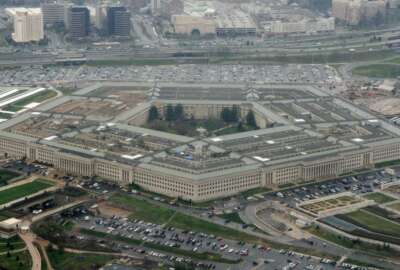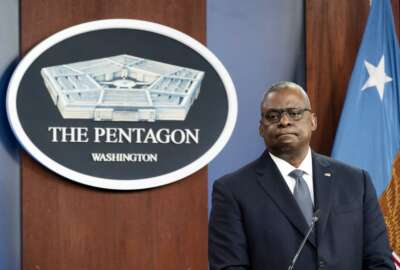DoD mulls how to return to office, promises telework is here to stay
In a March 16 memo, Deputy Defense Secretary Kathleen Hicks wrote that there will not be a “one-size-fits-all” plan to return to work.
As a new omicron subvariant, BA.2, of coronavirus starts to take hold in Europe and some Asian countries, the Defense Department is preparing a possible larger reentry to the workplace for its civilian employees.
However, things will not look like they did before the pandemic. In a March 16 memo, Deputy Defense Secretary Kathleen Hicks wrote that there will not be a “one-size-fits-all” plan to return to work, and Pentagon will implement the lessons it learned throughout the pandemic in order to create a more efficient and effective workforce. That means telework is here to stay and will be used more to make DoD a more flexible employer.
DoD is assuring employees that supervisors will discuss reentry plans for both full-time teleworking employees and workers who have come into the office during the pandemic. Hicks said specific reentry plans will be dependent on organizational needs, Health Protection Conditions and force health protection guidance.
“As we look at our reentry to the workplace, we can’t expect to return to ‘business as usual’,” Hicks said in a statement. “Throughout the pandemic we learned a lot about how we can embrace telework and flexible schedules to achieve new efficiencies in the workplace. We will continue to embrace successful practices to promote a more resilient and productive workforce that can attract new talent and retain our top performers.”
Unless there is an urgent, mission-critical need for employees to return to work, supervisors must provide at least a 30-day notice in writing before adjusting schedules or recalling any category of civilian employees.
“Prior to issuing this new direction, the department conducted listening sessions to learn from the experiences of the total force,” a DoD statement reads. “Participants expressed a desire to continue practices which promote a safe and healthy work environment, as well as a desire for leaders to reimagine the ‘future of work’ and an inclusive culture regardless of worksite or status.”
DoD is currently looking at ways to incorporate more flexibilities like telework into its human capital and personnel policies.
Military officials said during the pandemic that they saw an increase in productivity and satisfaction from employees and signaled that they would not return to pre-pandemic work practices.
“We really shattered the myth that you can’t do any work at DoD via a telework situation,” said Lisa Hershman, DoD’s former chief management officer, during the pandemic.
Chief of Navy Personnel Vice Adm. John Nowell agreed.
“It certainly removes distractions,” he said. “Teleworking has helped us be very efficient and very productive, and I think it’s true for the entire Navy that what we look like on the tail end of this as we come out of it and how we manage and lead our workforce will be different than pre-COVID.”
At this point all 50 states and the District have decided to lift their mask mandates and the national seven-day average is at about 30,000 new cases.
On March 2, the Pentagon Reservation announced it was dropping its mask mandate as it moved to Health Protection Condition Bravo for the first time in 2022.
“DoD remains committed to protecting our people, maintaining mission readiness, and supporting the whole-of-government effort response to COVID-19,” Pentagon officials wrote in a statement. “We are continually emphasizing to our people the requirement to get fully vaccinated for COVID-19, and encouraging everyone eligible to get a booster shot and take actions to protect themselves and those around them by employing protective measures, including practicing good hand washing, social distancing, wearing tight-fitting face coverings, and taking appropriate actions if feeling sick now. These can dramatically decrease the risk of infection and slow COVID-19’s spread.”
Copyright © 2024 Federal News Network. All rights reserved. This website is not intended for users located within the European Economic Area.
Scott Maucione is a defense reporter for Federal News Network and reports on human capital, workforce and the Defense Department at-large.
Follow @smaucioneWFED







